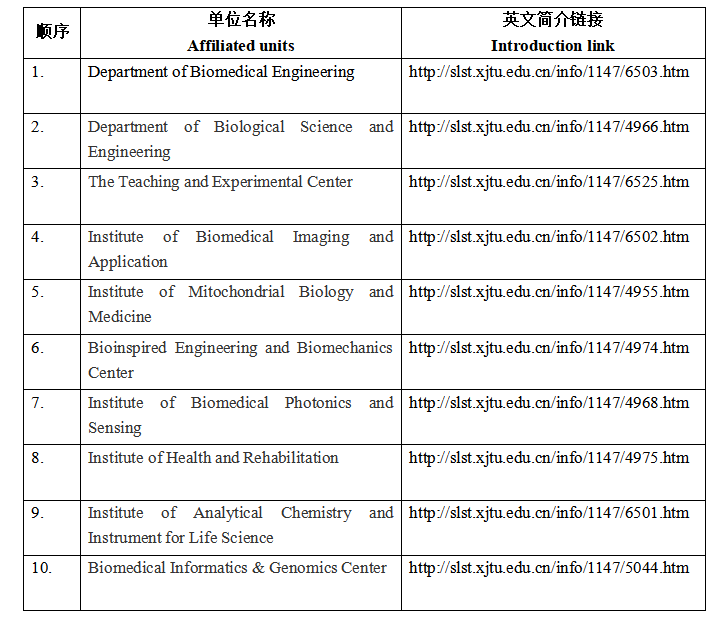The School of Life Science and Technology (SLST)
Website of the School: /xjtu/mu_slst/info/1143/1451.htm
The School of Life Science and Technology (SLST) at Xi'an Jiaotong University (XJTU) was a founder of the discipline of biomedical engineering in China, and continues to both shape global leaders and drive cutting edge research across several key disciplines. SLST's national leadership was affirmed in 1988, when its Biomedical Engineering (BME) Department was honored as a National Key Discipline. SLST grew into the world-leading school it is today from its beginnings in 1978 through decades of mergers and focused growth in critical research areas.
History. The highly cross-disciplinary nature of the SLST as we know it today was catalyzed by a merger in 2000 of XJTU's BME department (founded 1978) and Biology Department (founded 1996) with the disciplines of information science, medicine and biology, from Xi'an Medical University and Shaanxi Financial & Economic College. These now form the BME Department, the Department of Biological Sciences and Engineering, and the Experimental Teaching Center.
Undergraduate programs. SLST sponsors three undergraduate majors: BME, Biotechnology and Chemical-Biology Experimental Class, and Biotechnology. SLST's Biotechnology major is one of the first batch of National Strong Foundation Plan majors, and SLST's BME major is honored on the National First-Class Undergraduate Major Construction List.
SLST has since its inception been renowned for its innovations in teaching, and this continues to the present. In the period of 2015-2020 alone, SLST spearheaded 36 teaching research projects, published more than 20 teaching research papers, and published 14 textbooks. SLST students have won hundreds of awards in engineering and life science competitions, and have graduated to become leaders in industry and academia in China and around the world. Recent honors include XJTU's first gold medal in the International Genetically Engineered Machines (iGEM) competition, and the Self-Empowerment Star of Chinese University Students.
Graduate and post-graduate programs. SLST founded one of China's first doctoral programs in BME, and has since added doctoral programs in biochemistry and molecular biology (2000), biophysics (2003), and biology (2011). It houses postdoctoral programs in both BME and biology, with the Postdoctoral Foundation of China bestowing the title of "outstanding postdoctoral station" on the BME program.
Faculty and staff. The more than 150 faculty and staff of SLST are vibrant world leaders. Senior faculty include nearly 40 professors and over 40 associate professors, and include established international experts and rising stars in their respective fields. SLST houses five national experts including a National Brilliant Contribution Young and Mid-career Specialist, National Hundred, Thousand, and Ten Thousand Plan Professors, Changjiang Professors, and National Science Foundation Outstanding Young Scientists. In addition, SLST has 7 members of the faculty receiving National Young Talents awards, 9 receiving Provincial Ministerial Young Talents awards, and 2 XJTU leading scholars.
Research. The core of SLST's research effort in BME and biology is the Institutes for Biomedical and Health Engineering (IBHE) at the Western China Science and Technology Innovation Harbor, established in 2019. Guided by the "Health China 2030" planning outline, and focusing on the "Four Directions" and on cross-disciplinary and university-enterprise alliance models, IBHE focuses on 5 research platforms: medical information and intelligent engineering; biomedical sensing and molecular diagnosis; medical ultrasound and high-tech imaging; biomolecular and micro-nano technology; and biological science and technology. These platforms provide foundations for research excellence in biomedicine and health, including focused thrusts in biomedical ultrasound, multimodal imaging, mitochondrial biology, mitochondrial medicine, bioinspired engineering, biomechanics, biophotonics and sensing, health and rehabilitation sciences, analytical chemistry and instrumentation for life sciences, and biomedical information and genomics.
This SLST has a strong history of research productivity and impact. From 2015-2020 alone, SLST published more than 600 SCI papers and had nearly 200 patents awarded. We have undertaken major projects including the National Natural Science Foundation of China Major Instrument Special Project and the National Key Research and Development Program. Our work has been supported by over 115 million yuan in scientific research from 2015-2020, and has been recognized with 6 provincial and ministerial awards, including the Chinese Patent Gold Award. The "Ultrasonic Microbubble Contrast Imaging" technology pioneered at SLST has been recognized as one of China's top 10 medical advances.
Major projects and centers. SLST houses many major key projects from the Ministry of Science and Technology, the National Natural Science Foundation of China, Shaanxi Province, and industry. These include the Key Laboratory of Biomedical Information Engineering of the Ministry of Education, the Key Laboratory of Neurofunctional Information and Rehabilitation Engineering of the Ministry of Civil Affairs, the Key Laboratory of Biomedical Engineering of Shaanxi Province, the Translational Center for Nutrition and Health of Shaanxi Province, the Shaanxi Bioinspired Engineering and Biomechanics International Joint Research Center, and the Shaanxi Mitochondrial Biomedical Innovation and Intelligence Base.
Outlook. As it approaches its fifth decade of leadership in life sciences and technology, SLST will continue to harness its substantial resources, including the IBHE, to develop global in its areas of focus. Opportunities abound as we continue to train and gather global talent, organize first-class teams, cultivate first-class talent, and forge first-class culture for the purpose of global impact in solving the most important problems facing human health.

